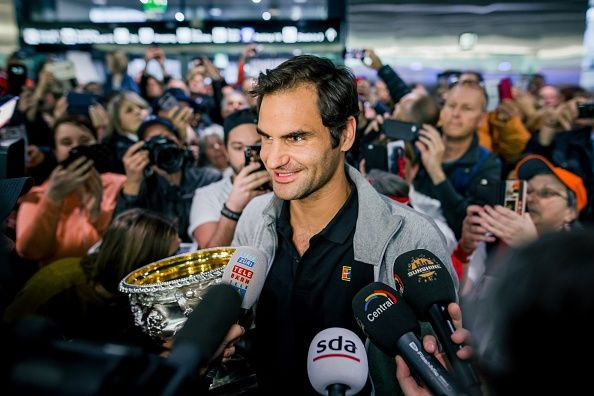How Roger Federer Inspired Manchester United To Win 2008 Champions League

Rene Meulensteen revealed how 20-time Grand Slam champion Roger Federer helped inspire Manchester United to win the 2008 Champions League against rivals Chelsea.
The game finished 1-1 that fateful day at the Luzhniki Stadium in Moscow, Russia, as both sides could not be separated after 120 minutes of action.
The drama then unfolded during the penalty shootout as United star man Cristiano Ronaldo, who scored earlier in the game, missed his side's first penalty. It looked like Chelsea captain John Terry would later capitalize and go on to score the winning penalty for the Blues only for him to crucially slip and hit the post.
United would bounce back to win the shootout after goalkeeper Edwin van der Sar saved Nicholas Anelka's penalty in what, to this day, is the Manchester side's last triumph in Europe's elite competition.
The winning mentality United displayed on the night can be credited to the players using Federer's example as instructed by former first team coach Meulensteen, whose main reasoning was even when the Swiss legend played bad, it would be forgotten because he would always go on to win in the end.
"I am a keen tennis fan and I have always admired Roger Federer and the way he controls his emotions," Meulensteen told Planet Football on the 10-year anniversary of United's last Champions League win. "I selected five clips of Federer for the boys to watch and asked them to write down which tournament he was appearing in, which set it was and which point."
"They would identify, say, Wimbledon as the competition, but they couldn’t tell me which point or set it was. The point I made to them was that wherever Federer was playing, he was winning and performing at the highest level when it really mattered. He would win the first set, then lose the second and the third but, by the time the game reached match point, everything which had happened before didn’t matter because he was so focused on winning."
At the time of the final, Federer notably won an impressive 11 of the last 17 Grand Slams as Meulensteen made the analogy to then manager Sir Alex Ferguson after their Champions League semifinal win over Barcelona.
United had not secured the Premier League at the time and in between the Barcelona games, lost to Chelsea 2-1 as the latter moved level on points with the reigning champions with two games remaining.
Ferguson's men, though, would go on to defeat West Ham United and Wigan in must-win games to retain their title by two points before going on to win the Champions League and securing the double.
"I said to the boss after we had won against Barcelona that, even if we beat West Ham and Wigan and are champions, we have to press the restart button ahead of the Champions League final with Chelsea," Meulensteen added. "We were 40-30 on our own serve, so it was our Federer moment and that is exactly where we needed to be."
"When Terry came up to take the penalty, he thought, 'This is all about me – all the lights are on me.' He pushed his captain's armband up, but he lost focus and slipped. The difference with us was that Nani, Anderson, Ryan Giggs and our other penalty takers were clinically focused. ... When Anelka stepped up, I couldn’t watch but I knew, whatever happened, Edwin was determined that he was going to stop that penalty because he was a winner – it was his Federer moment. To win the Champions League and share that euphoria with the players, the staff and the fans was an unbelievable feeling."
© Copyright IBTimes 2024. All rights reserved.





















